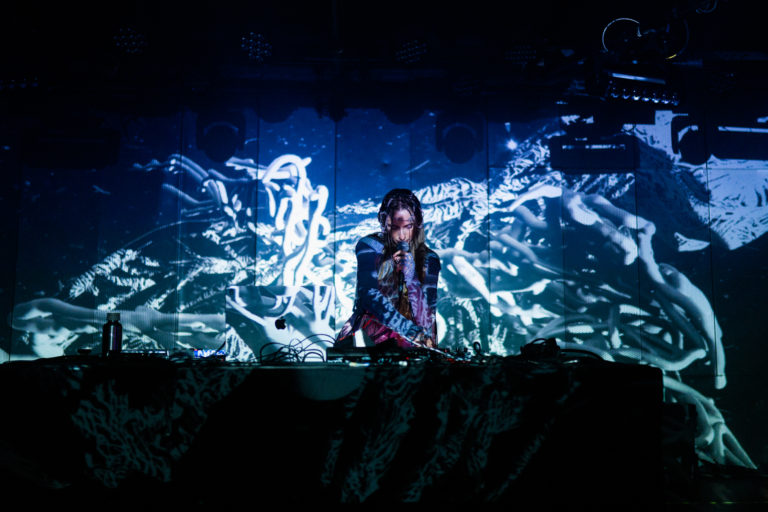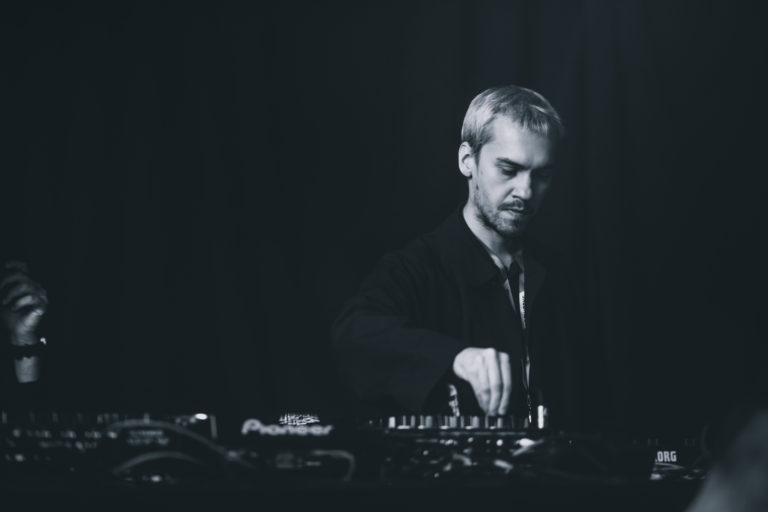Author: Łukasz Warna-Wiesławski
When the Berlin Wall fell over thirty years ago, Eastern European countries* were promised that embracing capitalism and joining the European Union would lead to erasing the economical differences between regions. While it's hard to disregard the individual success stories and new possibilities opened by increased mobility through the decades —from artists moving to cultural hubs in the West to festivals building international audiences thanks to their weak currencies and the rise of cheap air travel— the overall picture is less than optimistic. Europe is still divided into two parts, with the East almost invisible in festival and club lineups, media and podcasts series, or the agencies rosters.

Katarina Gryvul at Nuits sonores 2023 – © William Chareyre
While this is an article about a particular music scene, it’s impossible to look at any issue solely through the microscope. The current problems of late-stage capitalism are insolvable from the ground up. In Larry Wolff’s Inventing Eastern Europe: The Map of Civilization on the Mind of the Enlightenment, the author argues that the Eastern and Western Europe division was artificially conceived in the 18th century to uphold the image of backwards lands east of Berlin. The excellence of this book lies in the fact that Wolff doesn’t really need to argue hard as the book consists mostly of lengthy and often disturbing quotes from the likes of Voltaire or Casanova.
Their approach to Eastern Europe still echoes in the sentiments of the supposedly progressive Western left, from the recent comment of the British Labour leader Keir Starmer for whom the fact that a British family might be poorer than a Polish one is an outrageous and unimaginable fact, or the pan-European political movement DiEM25 founder Yanis Varoufakis response to the Russian invasion of Ukraine thinking of Eastern Europe as the buffer zone, removing any agency from the people he’s speaking of. When one looks at the recent Trump presidency, Brexit and the rise of transphobia in the UK, Marine Le Pen almost becoming the president of France, Giorgia Meloni anti-immigrant stance in Italy, they might wonder if there’s anything that truly sets the East and West apart except for the wealth acquired through colonialism. It is certainly not the music scene, which was built on the back of Black artists and currently profits mostly white celebrities, directors, and CEOs.
Booking practices of European festivals
With the prevalent attitude towards East Europeans being ignorance or reluctance it’s not a surprise that it’s subconsciously mirrored in the festival line-ups across the continent, even those who call themselves open-minded, progressive, and adventurous. The European Union funds several programs supporting mobility of artists in different genres. Taking a look at some like We Are Europe (2016-2021) and SHAPE (Sound, Heterogeneous Art and Performance in Europe–since 2014), one can read that they aim to “formulate and advance a new vision of Europe” and “present a variety of idiosyncratic music and sonic art from all over Europe”. What happens in reality is that most of the festivals that benefited from these funds over the last decade don't invite even as many Eastern European acts as 10%. With Russian invasion on Ukraine serving as a final reminder for Western Europe that the East needs to be treated as an equal, in 2022 Malmö-based Intonal had 8% of program devoted to such artists and 0% in 2023, Les Siestes Electroniques in Toulouse went from 6% to 0% as well, while Elevate in Graz from 6% to 7%. Nuits Sonores in Lyon went from 4% in 2022 to 5% in 2023, and Barcelona's edition of Sónar had only 1% in 2022 and stayed at the same level only if you count German tech house superstar Solomun as Bosnian, as he moved from Travnik to Hamburg as a young boy. In turn, the Italian festival Terraforma did not invite a single Eastern European act in 2022 and only booked Lolina in 2023, an Estonian artist based in London since the late 00s.
It's important to note that many of the Eastern Europeans who are present on those line-ups, are already based in the West, often forced to move to cultural capitals such as London or Berlin, when they find it impossible to further their careers at home. Eastern European acts are almost never booked when they're not on a Western booking agency roster, and they are rarely on a Western booking agency roster if they're still living in their hometown. Adding the fact that events line-ups budgets in the East are often heavily skewed towards the Western headliners, allocating anything between 50% and 90% towards the headliners fee and comparing living costs in e.g. Germany with one of the richest Eastern European countries such as Poland (average salary of €4101 vs €1400, while an identical grocery basket at Lidl can be 1-10% more expensive in Poland), it's hard not to see underground music as an elaborate cargo cult. Making even the best and most original music in one of the countries who fell on the wrong side of the wall often means being relegated forever to the support role.

Bartosz Kruczyński at Reworks – © Sotiris Maditsis
Escaping the past, protecting the future
Sometimes it seems like post-1945 Eastern Europe was just signed off to the Soviets and imperial politics of Germany and Austria are forgotten. This neglect was present e.g. in the 2022 edition of Donau Festival in Krems, which devoted its line-up to decolonial thought under the theme “Stealing the Stolen”. As the festival is highly invested in politics and talks about social justice, it builds a certain expectancy to react to current issues. Obviously, it might've been hard for a festival happening in late April to include Ukrainian artists in the wake of the Russian invasion, why did a thought to include Eastern European acts not occur earlier? At its peak, the Austrian Empire consisted of Hungarians, Czechs, Slovaks, Poles, Ukrainians, Slovenes, Croats, and Serbs and reached as far as Lviv. This year, the festival's subject is the climate crisis, so while the organisers ponder what can or can't be done, touring acts Big Brave, Lingua Ignota, and Nihiloxica will fly in from Canada, the USA, and Uganda, while no Eastern European from train accessible locations acts are present.
While most of the festivals on the continent are just extensive parties featuring a number of overpaid techno DJs, it feels weird when curators fighting for global justice remain indifferent to an ongoing crisis happening on their doorstep. The independent music scene somehow just doesn't feel morally obligated to change its booking practices in the wake of the Russian invasion of Ukraine. As a genocide happens just a few hundred kilometres away and the Russian regime aims to erase Ukrainian identity and threatens to come for Estonia, Latvia, Lithuania, Moldova, Poland and Sakartvelo next, the cultural programmes of so-called progressive part of the scene remain unchanged with no self-reflection or the need to protect something that is at risk of being wiped out from existence.
Looking inward
It would be easy to look for enemies everywhere and succumb to the “EU bad” narrative omnipresent in right-wing propaganda, but the problem is deeper and lies within the Eastern Europeans as well, continuously going against their class interests and nurturing their inferiority complex. The invasion of British festivals on Adriatic beaches did not put Croatian artists in the spotlight. Inviting Berliners to take advantage of Kyiv's lack of Covid restriction was not reciprocated when people got vaccinated. And when you look at the 2022 and 2023 festival line-ups, you'll quickly notice that the Eastern European festivals are not only not interested in supporting their neighbours, they also fail to include as many local acts as their counterparts from Norway, France, or Austria, as these are occupied by ticket selling acts from the West.
So, given that so many people in Eastern Europe are not interested in supporting their own, can one be mad that e.g. Vienna festival Hyperreality ignores artists from Bratislava despite being a 40-minute car ride away or that NTS doesn't have a regular manele show targeted towards Romanian working class in the UK to make them feel more accepted post-Brexit? The Oramics collective counted how many podcasts in Resident Advisor, FACT Magazine, and Crack are by Eastern European artists. It's less than 3%, less than 2%, and ca. 5,5% respectively. But looking at the names of club events here you would think that these are all all-nighters by imported acts and local artists are non-existent, and if they do, they're just names, with no stories, unique selling points, just random people who are not the main focus of the night. And while they might have a lot to say, their mixes contain mostly music released by Western labels anyway and their live acts have disappeared from regular weekend club nights overall due to production streamlining. One might notice the increased amount of coverage for Eastern European music in The Wire or The Quietus, where the Slovenian band Širom even topped one of the 2022 charts, but with algorithm and video-based social media ravaging everyone's attention spans it seems that the rift won't be fixed by any outside actors.
Beyond borders
It's hard to call for dialogue when everyone is fighting for scraps of a failing industry, but what is now needed is a conversation between the two sides and a realisation that Europe is a much larger organism with common threats across the whole continent. UK's TERFs and racists are no different from the Polish ones. Viktor Orbán may rule in Hungary, but Putin-indebted Santiago Abascal's VOX party in Spain, which lost 19 seats in the 2023 election, remains the country’s third largest political force. How these people are gaining influence is by parasitising on the feeling of inadequacy. In this context, the importance of independent culture cannot be understated. Representation and collaborations where everyone is equally heard and paid still have incredible power and simply cannot give way to extreme libertarianism masking fascism and app-driven individualism. With all the “PLURs” and “global voices” in the mission statements of various cultural organisations, now it's time to live up to the promises. It's equally important that Heinali's beautiful ode to Kyiv sounds in both in German theatres funded by the government that was fattening up the Russian oligarchs and in Polish cities that are now homes to hundreds of thousands of Ukrainians.
* For the purpose of this article Eastern Europe is defined as Slavic, Balkan and Baltic countries that were in the USSR sphere of influence after World War II: Albania, Belarus, Bosnia and Herzegovina, Bulgaria, Croatia, Czechia, Estonia, Hungary, Kosovo, Latvia, Lithuania, Moldova, Montenegro, Northern Macedonia, Poland, Romania, Serbia, Slovakia, Slovenia, Ukraine, as well as Russia, but not Greece, Cyprus, or Turkiye. It also ignores the concept of Central Europe due to huge economic differences between Germany, Switzerland, and Austria versus Poland, Czechia, Slovakia, and Hungary.
Published on May 28th, 2024
About the author:
Łukasz Warna-Wiesławski, is a curator, pr specialist, and music journalist based in Warsaw, mostly dealing with electronic and experimental music. They have been the co-curator and pr manager of Unsound Festival between 2012-2020, festival manager of Sacrum Profanum in 2021 and the pr manager of Audioriver Festival 2023. In 2020, they founded Tańce, a label devoted to releasing club music inspired by Polish folk traditions. They also DJ as Rusałka.